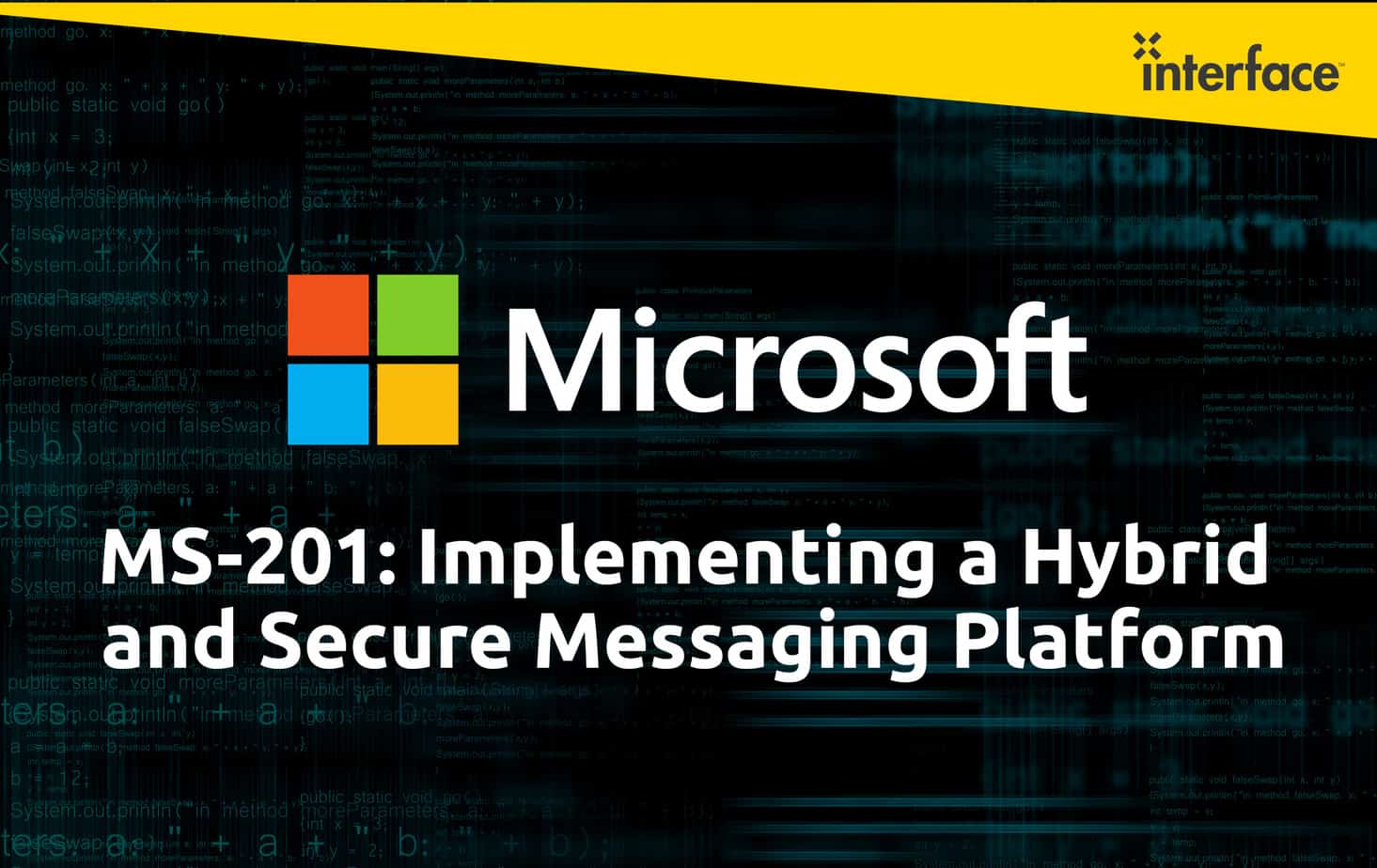
Day 1-2: Defining a Hybrid Messaging Strategy (MS-201T01-A)
Course Outline
Module 1: Performing Mailbox Migrations
Lessons
- Planning Mailbox Migrations
- Performing IMAP Migrations
- Performing Cutover and Staged Migrations
- Performing Advanced Migrations
Module 2: Planning a Hybrid Environment
Lessons
- Exchange Hybrid Deployment Requirements
- Planning to Run the Hybrid Configuration Wizard
Module 3: Deploying and Troubleshooting a Hybrid Environment
Lessons
- Deploying and Managing an Edge Transport Server
- Configuring a Hybrid Deployment using the HCW
- Implementing Advanced Hybrid Functionality
- Troubleshooting Hybrid Deployments
Module 4: Lab - Hybrid Deployment and Management
Lab : Hybrid Deployment and Management
- Exercise 1: Perform a mailbox migration to Microsoft 365
- Exercise 2: Manage hybrid scenarios
Day 3-4: Managing Messaging Security, Hygiene, and Compliance (MS-201T02-A)
Course Outline
Module 1: Managing Message Hygiene
Lessons
- Planning for Message Hygiene
- Managing Anti-Malware and Anti-Spam Policies
- Managing Advanced Threat Protection
Module 2: Managing Compliance
Lessons
- Messaging Compliance in the SCC
- Messaging Compliance in Exchange
- Managing Exchange Online Archiving and Auditing
- Managing Content Search
Module 3: Managing Role-Based Permissions
Lessons
- Managing Admin Roles
- Managing User Roles
- Exchange Setup - RBAC and AD Split Permission
Module 4: Lab - Manage Message Hygiene
Lab : Manage Message Hygiene
- Exercise 1: Manage message hygiene in an on-premises solution
- Exercise 2: Manage message hygiene in a cloud solution
- Exercise 3: Manage message hygiene in a hybrid solution
Day 1-2: Defining a Hybrid Messaging Strategy (MS-201T01-A)
Audience profile
The Messaging Administrator deploys, configures, manages, and troubleshoots recipients, permissions, mail protection, mail flow, and public folders in both on-premises and cloud enterprise environments. Responsibilities include managing message hygiene, messaging infrastructure, and hybrid configuration and migration. The Messaging Administrator also implements and manages disaster recovery, high availability, and client access. The Messaging Administrator collaborates with the Security Administrator and Microsoft 365 Enterprise Administrator to implement a secure hybrid topology that meets the business needs of a modern organization. The Messaging Administrator should have a working knowledge of authentication types, licensing, and integration with Microsoft 365 applications.
Day 3-4: Managing Messaging Security, Hygiene, and Compliance (MS-201T02-A)
Audience profile
The Messaging Administrator deploys, configures, manages, and troubleshoots recipients, permissions, mail protection, mail flow, and public folders in both on-premises and cloud enterprise environments. Responsibilities include managing message hygiene, messaging infrastructure, and hybrid configuration and migration. The Messaging Administrator also implements and manages disaster recovery, high availability, and client access. The Messaging Administrator collaborates with the Security Administrator and Microsoft 365 Enterprise Administrator to implement a secure hybrid topology that meets the business needs of a modern organization. The Messaging Administrator should have a working knowledge of authentication types, licensing, and integration with Microsoft 365 applications.
This course is designed for persons who are aspiring to the Microsoft 365 Messaging Administrator role.
Day 1-2: Defining a Hybrid Messaging Strategy (MS-201T01-A)
At course completion
After completing this course, students will be able to:
- Plan Mailbox Migrations
- Plan IMAP Migrations
- Plan Cutover and Staged Migrations
- Perform Advanced Migrations
- Understand Exchange Hybrid Deployment Requirements
- Run the Hybrid Configuration Wizard
- Deploy and Manage an Edge Transport Server
- Configure a Hybrid Deployment using the HCW
- Implement Advanced Hybrid Functionality
- Troubleshoot Hybrid Deployments
Day 3-4: Managing Messaging Security, Hygiene, and Compliance (MS-201T02-A)
At course completion
After completing this course, students will be able to:
- Plan for Message Hygiene
- Manage Anti-Malware and Anti-Spam Policies
- Manage Advanced Threat Protection
- Plan for Messaging Compliance in the SCC
- Plan for Messaging Compliance in Exchange
- Manage Exchange Online Archiving and Auditing
- Manage Content Search
- Manage Admin Role-based Permissions
- Manage User Role-based Permissions
- Plan for Exchange Setup - RBAC and AD Split Permissions
 Print Page
Print Page